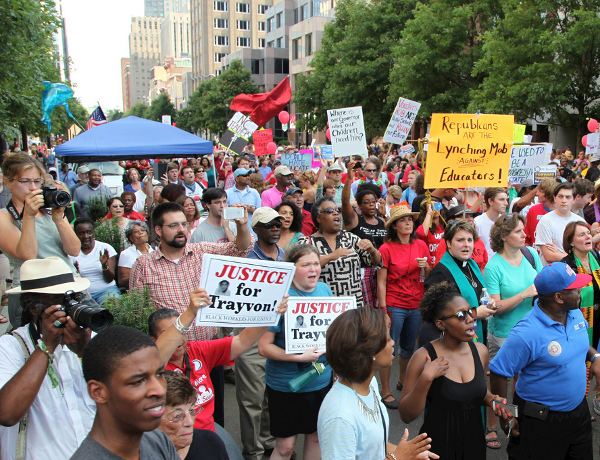
PHOTO/MATTHEW LENARD
The Moral Monday Movement
ATLANTA, GA — 10,000 voices roaring as one shook the streets of Raleigh, North Carolina: “Forward together, not one step back!” After thirteen straight “Moral Mondays” in which more than 900 were arrested while protesting what they called the extreme politics of their legislature, they gathered for the final session, determined that this was a movement that would continue on. “This is no momentary hyperventilation or momentary protest. This is a movement,” declared the Reverend William Barber, president of the N.C. NAACP.
The Moral Monday movement has been about protesting legislation and policies passed that can be viewed as nothing less than a direct attack on a new social movement that cuts across color, gender and every social identity. These draconian laws affect the very survival of many, including cuts to education, employment and benefits, health care, the very infrastructure of their lives. And particularly with regard to the passage of voting rights restrictions, they constitute a “crime against democracy,” according to Rev. Barber.
As promised, the movement continues, “Mountain Moral Monday” took place in Asheville, NC on August 5, the first of other gatherings to take place across the state. The specific issue affecting the citizens of Asheville was a new law that would take the municipal water system away from the city and put it in the hands of the state. “Theft by the state” is what some are calling it.
But those who are participating in the Moral Monday movement and who came to Asheville (between 8,000-10,000) are seeing that their movement is not just about single issues, but represents a uniting of many causes. Says Rev. Jasmine Beach-Ferrara of the Campaign for Southern Equality in Asheville, “We are part of every single community represented here. When you attack any community, you attack us. When you attack us, you attack every community.”
In his remarks to the crowd assembled in Asheville about the meaning and significance of this movement, Rev. Barber drew comparisons between now and that period in Southern history that came on the eve of the defeat of Reconstruction and the installment of the counter-revolutionary “Redeemer” governments. Barber calls the movement today a “third Reconstruction,” and the extreme reactionary governments today are not unlike the Redeemer governments of old. As Jeff Shaw of NC Justice puts it, the moral Monday movement “shows how a diverse army of people can band together to combat regressive political tactics.”
Today is different. Today is something new. “We are destroying the myth of the old white Southern strategy – that you can hurt some people without hurting everybody. We’re all interconnected. This old divide and conquer is not going to work anymore,” said Rev. Barber.
As the Occupy Wall Street movement expressed it, it’s not just one thing; it’s everything. The Moral Monday movement takes it a step further. They assert a commonality of causes and a commonality of a class, And they are taking the battle right where it needs to go, directly before the corporate-government, not begging, but demanding: We must have a government that operates in our interest. “A new North Carolina, a new South, a new future.”
